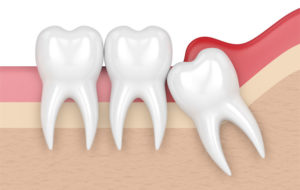Wisdom teeth are the last set of molars at the back of your mouth, typically appearing in your late teens or early twenties. Sometimes, these teeth can become “impacted,” meaning they don’t have enough space to come in properly. This can lead to various oral health problems, including pain, infection, and tooth damage. If you think your wisdom teeth might be impacted, it’s important to recognize the signs and get them checked out. This article will help you understand how to tell if your wisdom teeth are impacted, how to identify the symptoms, and whether they can resolve on their own.
How Do I Know If My Wisdom Tooth is Infected or Impacted?

An impacted wisdom tooth can cause a variety of symptoms that might feel similar to other dental problems. However, an infected wisdom tooth and an impacted one are different, though an impacted tooth can become infected.
Signs of an Infected Wisdom Tooth:
- Pain or Swelling: If the gum around your wisdom tooth is swollen or painful, it may be infected.
- Pus or Drainage: You may notice pus or a bad taste in your mouth near the wisdom tooth, which is a sign of infection.
- Red or Bleeding Gums: Infected wisdom teeth can cause the gums to bleed or appear inflamed.
- Fever: An infection can cause a fever, making you feel unwell.
- Difficulty Opening Your Mouth: If your wisdom tooth is infected, it may make it hard to open your mouth fully.
Signs of an Impacted Wisdom Tooth:
- Pain: Impacted wisdom teeth often cause pain in the back of your mouth. The pain may feel dull or sharp and can worsen when chewing.
- Pressure: You may feel pressure in your jaw or at the back of your mouth as the tooth pushes against other teeth or the jawbone.
- Swelling or Tenderness: Swelling around the impacted tooth and the surrounding gum tissue is common.
- Red or Inflamed Gums: The gums around an impacted tooth may become red and inflamed, particularly if the tooth is trying to erupt but doesn’t have enough space.
An impacted wisdom tooth doesn’t always get infected, but the two conditions can happen together. If you’re experiencing any of these symptoms, it’s a good idea to schedule a visit to your dentist for an examination.
Can an Impacted Wisdom Tooth Resolve Itself?
An impacted wisdom tooth typically doesn’t resolve on its own. While your body might try to push the tooth through the gum line, there may not be enough space for it to fully erupt. This can cause ongoing pain, discomfort, and other complications. In some rare cases, the tooth may partially erupt through the gum and stop, but it usually doesn’t move into a healthy position by itself.
What Can Happen if You Don’t Treat an Impacted Wisdom Tooth:
- Infection: An impacted tooth can cause gum infections if it doesn’t come through the gum properly.
- Cysts: Fluid-filled cysts can form around an impacted tooth, which may lead to bone damage.
- Damage to Nearby Teeth: An impacted wisdom tooth can push against neighboring teeth, causing them to shift or become damaged.
- Pain and Swelling: An impacted tooth can cause persistent pain and swelling that won’t go away without treatment.
The best way to address an impacted wisdom tooth is to consult with your dentist or oral surgeon, who can help determine if removal is necessary.
How Do I Know if My Wisdom Tooth is Erupting?
A wisdom tooth is considered to be “erupting” when it begins to come through the gum line. While some people’s wisdom teeth grow in smoothly, others might have difficulty because the teeth don’t have enough space to fully emerge. Recognizing the signs of eruption can help you identify if your wisdom tooth is on its way in or if it’s getting stuck under the gum.
Signs of Erupting Wisdom Teeth:
- Mild Pain or Tenderness: As the tooth pushes through the gum, it can cause mild discomfort, especially when chewing.
- Slight Swelling: The gum around the erupting wisdom tooth may become slightly swollen as it breaks through.
- Changes in the Gum Line: You might notice a small bump or visible sign that the tooth is trying to come in.
- Bad Taste or Odor: Sometimes, as the tooth erupts, bacteria can get trapped under the gum, causing a bad taste or odor in your mouth.
If you feel like your wisdom tooth is coming in but are unsure, your dentist can take X-rays to confirm whether the tooth is simply erupting or if it’s becoming impacted.
Is My Wisdom Tooth Growing or Impacted?
Sometimes, it’s difficult to tell whether your wisdom tooth is growing normally or if it’s impacted. Here are some ways to figure it out:
What Happens When a Wisdom Tooth Is Growing Normally:
- Slow and Steady: A wisdom tooth that is growing in properly will usually emerge slowly and without causing much pain. You may feel some tenderness as it erupts, but the pain should be manageable.
- No Pressure on Other Teeth: If the tooth is coming in straight and has enough room, it won’t push against the neighboring teeth or cause discomfort in the rest of your mouth.
- No Swelling or Infection: Healthy erupting wisdom teeth won’t cause the gum to swell, get red, or become infected.
What Happens When a Wisdom Tooth Is Impacted:
- Pain and Pressure: If the tooth is trapped under the gum or is growing at an angle, it can cause pain or pressure in the surrounding area.
- No Room to Erupt: An impacted wisdom tooth often won’t have enough room to come in properly, which can lead to a buildup of bacteria and infection.
- Changes in Your Bite: As the tooth pushes against your other teeth, it can shift their position, which might affect your bite or cause additional pain.
If your wisdom tooth is causing discomfort and doesn’t seem to be coming in straight, it’s a good idea to get an X-ray to determine if it’s impacted or just slow to come in.
What Does Wisdom Tooth Impaction Feel Like?

If your wisdom tooth is impacted, you may experience a variety of symptoms. The most common feelings associated with an impacted wisdom tooth include:
- Pain: Impacted wisdom teeth can cause sharp or dull pain, especially when chewing or moving your mouth.
- Swelling: The gum tissue around the impacted tooth can swell, making your jaw feel tender.
- Jaw Stiffness: If your wisdom tooth is causing pain, you may have trouble opening your mouth fully or feel stiffness in your jaw.
- Pressure: An impacted tooth often presses against other teeth, causing pressure in the back of your mouth.
- Gum Redness or Bleeding: The gum around an impacted tooth can become red and inflamed, and it may bleed when you touch it or try to brush around it.
The discomfort from an impacted wisdom tooth can range from mild to severe. In some cases, the pain may come and go, but if it’s persistent or getting worse, you should see a dentist to prevent further complications.
Conclusion
If you think your wisdom teeth might be impacted, it’s important to pay attention to the symptoms and seek professional advice. While the symptoms of an impacted wisdom tooth can sometimes be mild, ignoring them can lead to infection, tooth damage, and other oral health issues. If you’re experiencing pain, swelling, or difficulty chewing, it’s a good idea to consult your dentist. They can help you determine if your wisdom tooth is impacted, erupting, or simply growing in slowly.
Remember, even if your wisdom teeth don’t cause immediate problems, regular dental checkups are key to catching any potential issues early. Whether your wisdom tooth needs to be removed or can be monitored, your dentist will guide you toward the best treatment plan.

